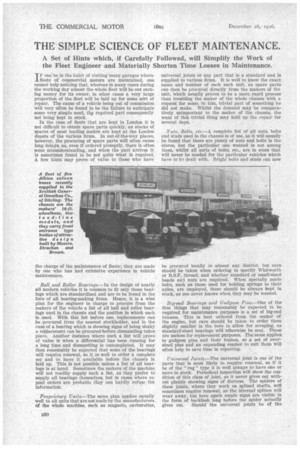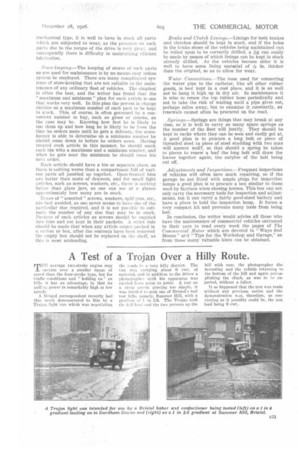THE SIMPLE SCIENCE OF FLEET MAINTENANCE.
Page 48

Page 49

If you've noticed an error in this article please click here to report it so we can fix it.
A Set of Hints which, if Carefully Followed, will Simplify the Work of the Fleet Engineer and Materially Shorten Time Losses in Maintenance.
IF mei* in the habit of visiting many garages where fleets of commercial motors are maintained, one cannot help noticing that, whereas in many cases during the working day almost the whole fleet will be out earning money for its owner, in other cases a very large proportion of the fleet will be laid up for some scht of repair. The cause of a vehicle being out of commission will very often be found to be the failure to anticipate some very simple need, thp required part consequently not being kept in stock.
In the case of fleets that are kept in London it is not difficult to obtain spare parts quickly, as stocks of spares of most leading makes are kept at the London depots of the various firms. In out-of-the-way places, however, the procuring of spare parts will often cause long delays, as, even if ordered promptly, there is often some misunderstanding, and when the part arrives it is sometimes found to be not quite what is required. A few hints may prove of value to those who have
the charge of the maintenance of fleets; they are made by one who has had extensive experience in vehicle maintenance.
Ball and Roller Bearings.—In the design of nearly all modern vehicles it is common to fit only those bearings which are standardized and are to be found in the lists of all bearing-making firms. Hence, it is a wise plan for the engineer in charge to procure from the makers of the vehicle a list of all ball and roller bearings used in the chassis and the position in which each is used. With this list before one, replacements can be procured from the nearest stockholder, and in the ease of a bearing which is showing signs of being shaky a replacement can be procured-before dismantling takes place. Another instance where such a list will prove of value is when a differential has been running for a long time and dismantling is contemplated. It may then reasonably be expected that some of the bearings will require renewal, so it is well to order a complete set and to have it available before the chassis is laid up. This is not possible unless a list of all bearings is at hand. Sometimes the makers of the machine will not readily supply such a list, as they prefer to supply all bearings themselves, but in cases where repeat orders are probable they can hardly refuse the Information.
Proprietary Units.—The same plan applies equally well to all units that are not made by the manufacturers of the whole machine, such as magneto, carburetter,
universal joints or any part that is a standard and is supplied to various firms. It is well to know the exact name and number of each such unit, as spare parts can then be procured directly from the makers of the unit, which usually proves to be a more rapid process than troubling the maker of the whole chassis with a request for some, to him, trivial part of something he did not make. Whilst the demand may be comparatively unimportant to the maker of the chassis, the want of this trivial thing may hold up the repair for several days. •
Nuts, Bolts, etc.—A complete list of all nuts, bolts and studs used in the chassis. is of use, as it will usually be found that there are plenty of nuts and bolts in the stores, but the particular one wanted is not among them, whilst all sorts of bolts, etc., are in store that will never be needed for the particular vehicles which have to 131 dealt with. Bright bolts and studs can now
be procured locally in almost any district, but care should be taken when ordering to specify Whitworth or B.S.F. thread, and whether standard or small-sized heads and nuts are required. When specially made bolts, such as those used for holding springs to their axles, are employed, these should be always kept in stock, as one never knows when they may be wanted.
Big-end Bearings and Gudgeon Pins.—One of the first things that may reasonably be expected to be required for maintenance purposes is a set of big-end brasses. This is best ordered from the maker of the engine, but care should be taken to order them slightly smaller in the bore to allow for scraping, as standard-sized bearings will otherwise be sent. These are useless for replacement purposes. The same applies to gudgeon pins and their bushes, so a set of oversized pins and an expanding reamer to suit them will often help to save time in repairing.
Universal Joints.—The universal joint is one of the parts that is most likely to require renewal, so if it be of the " rag " type it is well always to have one or more in stock. Periodical inspection will show the condition of this class of joint, as it never gives out without plainly showing signs of distress. The spiders of these joints, where they work on splined shafts, will sometimes require renewal, as the internal splines will wear away, but here again ample signs are visible in 1 he form of backlash long before the spider actuallY gives out Should the universal joints be of the mechanical type, it is well to have in stock all parts which are subjected to wear, as the pressure on such parts due to the torque of the drive is very great, and consequently there is difficulty in -maintaining, etiicient lubrication.
Siore-keeping.—The keeping of stores of such parts as are used for maintenance is by no means easy unless system be employed. There are many complicated systems of store-keeping that are not suitable to the maintenance of any ordinary fleet of vehicles. The simplest is often the best, and the writer has found that the " maximum and minimum" plan for each article is one that works very well. In this plan the person in charge decides on a maximum number of each part to be kept in stock. This, of course, is often governed by a convenient number to buy, such as gross or dozens, as the case may be. Knowing how fast he is likely to use them up and how long he is likely to be from the time he orders more until he gets a delivery, the storekeeper is able to determine on a minimum number he should come down to before he orders more. Having treated each article in this manner, he should mark each bin witn a maximum and a minimum number, and when he gets near the minimum he should issue his next order.
Each article should have a bin or separate place, as there is nothing worse than a compartment full of various parts all jumbled up together. Open-fronted bins are better than nests of drawers, and for small light articles, such as screws, washers, etc., there is nothing, beter than glass jars, as one can see at a glance approximately how many are in stock.
Boxes of " assorted " screws, washers, split-pins, etc., are hest avoided, as one never seems to have one of the particular size required, and it is not possible to estimate the number of any size that may be in stock. Packets of such articles as screws should be emptied into bins and not kept in their packets. A strict rule should be made that when any article comes packed in
carton or box, after the contents have been removed the empty box should not be replaced on the shelf, as this is most misleading.
Brake and Clutch :Lin ings.—Linings for both brakes and clutches should be kept in stock, and if the holes in the brake shoes of the vehicles being maintained can be relied upon to be correctly drilled, a jig can easily be made by means of which linings can be kept in stock already drilled. As the vehicles become older it is well to have some lining material of -eg in. thicker than the original, so as to allow for wear.
Water Connections.---The hose used for connecting the water pipe to the radiator, like all other rubber goodk is best kept in a cool place, and it is as well not to hang it high, up in dry air. In maintenance it is wise to renew the top rubber hose periodically and not to take the risk of waiting until a pipe gives out, perhaps miles away; but to examine it constantly, as renewals cannot often be procured on the road.
Springs.—Springs are things that may break at any time, so it is well -to carry as many spare springs as the number of the fleet will justify. They should be kept in racks where they can be seen and easily got at. A good plan is to procure a long bolt or piece of threaded steel (a piece of steel studding with two nuts will answer well), so that should a spring be taken to pieces to renew a leaf the long bolt will draw the leaves together again, the surplus of the bolt being cut off.
Adjustments and Inspections.—Frequent inspections of vehicles will often save much repairing, so if the garage be not fitted with ample plugs for inspection
• lamps a good plan is to procure a box similar to those used by farriers when shoeing -horses. This box can not only carry the necessary tools for inspection and adjustments, but it can carry a fairly good-sized battery and have a place to hold the inspection lamp. It forms a very compact kit and prevents many tools from being lost.
In conclusion, the writer would advise all those who have the maintenance of commercial vehicles entrusted to their care to read every week the pages of The Commercial• Motor which are devoted to "Ways find Means" ard "Tips for the Workshop and Garage," as from these many valuable hints can be obtained.




































































































